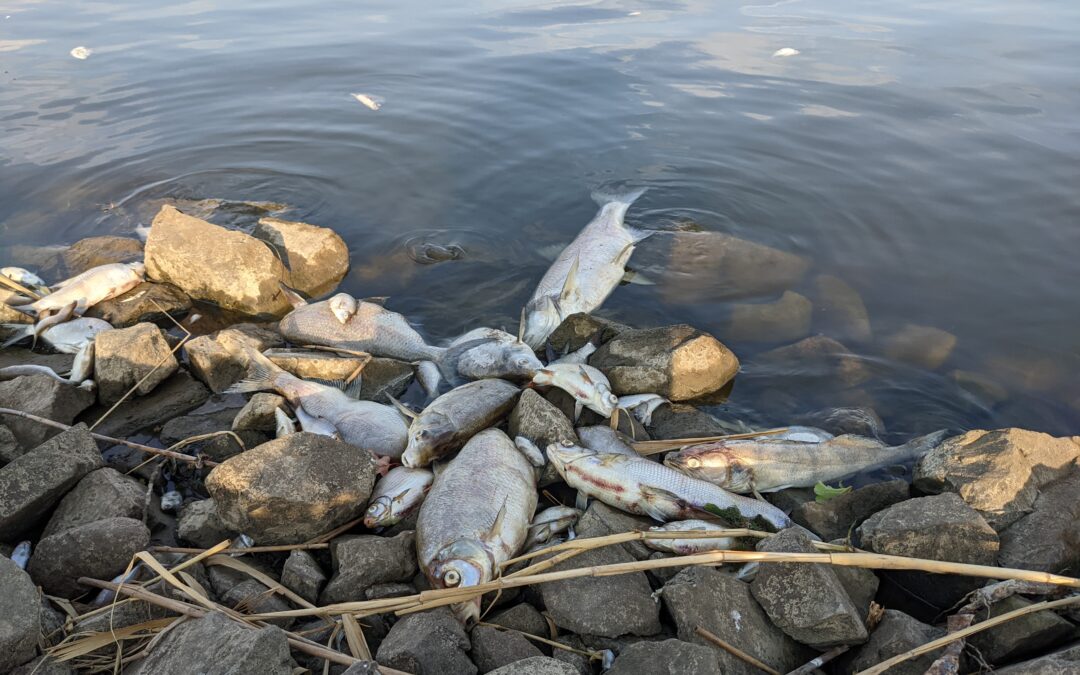Germany’s environment minister has said that Poland is not doing enough to protect the Oder that runs along their shared border after a new report showed that over half of fish in the river have died off following last year’s environmental disaster there.
“No paradigm shift can be seen” in Poland’s approach toward the river, said Steffi Lemke, who described the situation as “depressing”. “That is why the relationship remains tense,” she added, quoted by Die Welt.
However, Poland’s climate minister insists that the Oder is being properly managed, and a Polish government official has accused Germany of spreading disinformation about the situation in the river.
Nach Umweltkatastrophe: Oder-Fischbestand stark zurückgegangen #Brandenburg https://t.co/9UlBDjIhrD
— pnn.de (@PNN_de) June 26, 2023
Lemke’s remarks followed the release of findings this month by the Leibniz Institute of Freshwater Ecology and Inland Fisheries (IGB) in Berlin regarding the situation in the Oder following last year’s catastrophe.
The institute found that up to 1,000 tonnes of fish have died in the river – much higher than earlier estimates of 360 tonnes. As a result, fish stocks have declined between 53% and 67% in various parts of the river. For some fish species, losses were between 86% and 100%.
Meanwhile, other types of animals, including mussels and snails, “have also been severely decimated”, reports the IGB. Such losses have dangerous knock-on effects: mussels, for example, normally play a vital role in filtering algae from the water.
An EU report on the ecological disaster that killed 360 tonnes of fish in the Oder river last year has found:
– industrial waste was a key factor
– poor communication hampered responses
– the incident should be a "wake-up call" for better river management https://t.co/TohdbNlLnS— Notes from Poland 🇵🇱 (@notesfrompoland) February 27, 2023
The IGB notes that there are “some indications that the fish fauna could recover in the next few years, [but] there is still a risk that a similar catastrophe could recur” if the conditions that cause last year’s disaster – including low water levels and high salinity – happen again.
The institute’s testing has found that the toxin-producing Prymnesium parvum – so-called “golden algae” – which contributed to the mass fish die-off is now present throughout the river. Its concentrations are currently lower than last year but are “increasing again rapidly”.
The IGB makes it clear that this is due to “man-made environmental conditions”, in particular the input of saline wastewater into the river. The German authorities have previously blamed this on industrial and other types of discharge entering the Oder on the Polish side of the border.
“There is a certain concern that the situation on the Oder is similar to last summer,” warned the IGB’s director of research, Thomas Mehner, quoted by Die Welt.
Almost half a tonne of dead fish have been found in the canal that was the likely source of last year's environmental disaster in the Oder river.
The climate ministry says recent testing shows no signs of the algae linked to last year’s crisis https://t.co/aYo0m8V3r2
— Notes from Poland 🇵🇱 (@notesfrompoland) June 12, 2023
However, the Polish authorities have denied they are mismanaging the river. Last week, environmental minister Anna Moskwa visited the Oder to inspect measure being taken to “neutralise golden algae”. She promised a report on the sitaution by the end of June.
Meanwhile, the government’s plenipotentiary for security in the information space, Stanisław Żaryn, accused Germany of spreading disinformation about the Oder by presenting “selective information…to manipulate and build a negative picture of the situation on the river”.
Last year, Moskwa accused German media of spreading “fake news” about the catastrophe in the Oder, while the government official responsible for water management claimed that Berlin was exploiting the crisis to block planned Polish redevelopment of the river.
Selektywny dobór informacji to taktyka wykorzystywana do manipulacji odbiorcami i budowy obrazu zdarzeń korzystnego dla autora operacji informacyjnej.
Taktykę taką widać w działaniu mediów i polityków w RFN, którzy podejmują temat sytuacji na Odrze.
Więcej w prezentacji👇 pic.twitter.com/02qekdL798
— Stanisław Żaryn (@StZaryn) June 21, 2023
Main image credit: Hanno Bock/Wikimedia Commons (under public domain)

Daniel Tilles is editor-in-chief of Notes from Poland. He has written on Polish affairs for a wide range of publications, including Foreign Policy, POLITICO Europe, EUobserver and Dziennik Gazeta Prawna.




















